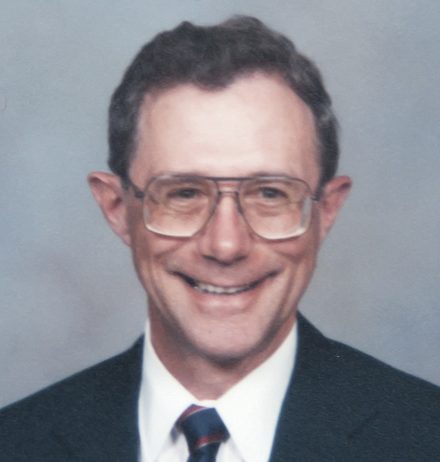
Harley William Moon, DVM, PhD died October 7, 2018 at age 82 in Danville, PA from the effects of Parkinson’s Disease and prostate cancer.
In a blizzard, on a horse-drawn hay sled struggling to the doctor in Tracy, Harley arrived March 1, 1936 to parents Harley A. and Catherine Moon. The story told by our grandmother and father.
In the grip of drought and The Depression, the young family scrambled to farm in southwest Minnesota. In Harley’s earliest years they lived in Balaton, Dovray, Garvin, Tracy, Walnut Grove, and Westbrook. Harley told stories about working as the bottle sorter at the grocery at age 5 or 6, then working on the farm, and later playing sports – boxing and football – through high school. His father, killed in 1945 WWII, left his mother with Harley and two younger brothers.
Catherine married Melvin Lien in October 1947 and he formed an important bond with Harley. About this time the vet taught Harley, appearances to the contrary, cholera wasn’t killing his young pigs. The disease killing his piglets was unknown, a mystery to science. Mel’s mentorship and the baby pig disease proved to be two major shapers in his life.
Harley met Irene Casper when they were high school sophomores and the two proved inseparable. They married June 9, 1956 in Tracy. Their partnership was strong; they shared enthusiasm, purpose, and a sense of community that included the world.
Harley is survived by his four children and their spouses: Michael (Gretchen), Joseph (Connie), Anne (Daniel Horwitz), and Teresa (William Higgins); four grandchildren: Emma, Samuel, and Thomas Moon, and Alia Moon Horwitz; and his three brothers: Spencer and Leroy Moon and Melvin Lien. He is preceded in death by wife Irene, parents, and stepfather.
Harley earned BS, DVM (1960), and PhD (1965) degrees at the University of Minnesota. While doing so, he and Irene completed their family in 1962. Graduate classmates from the St. Paul vet campus were neighbors in the staff houses at Rosemount and these rich relationships grew to productive, lifelong scientific–family collaborations. Harley’s early career took the family to Brookhaven National Laboratory in 1965 and then to the University of Saskatchewan, Saskatoon. In 1968, he joined the National Animal Disease Center in Ames and central Iowa became his base until 2015.
During his career Harley would arrange working sabbaticals, the first to Ohio State in 1973. Returning to Ames in ‘74, he would go to Canberra, Australia to study immunology with a friend in 1978. He returned to NADC, promoted to be the director in 1988. In 1995 he became the director of Plum Island Animal Disease Center. He returned to Iowa and was named to the Ramsey Chair in Veterinary Medicine at Iowa State University in 1996.
What was Harley pursuing? In his work he deciphered the pathology of the hog cholera-like E.coli infection that had taken his piglets. In solving this mystery he determined how these bacteria produce disease, significantly contributing to understanding intestinal diseases in animals, including humans, and this is one of the contributions for which he was elected to the National Academy of Sciences in 1991. His honors and awards include: induction to the USDA’s Science Hall of Fame in 2000, fellowship in the American Association for the Advancement of Science in 2003, two honorary doctorates, and numerous memberships, fellowships, medals, diplomacies, citations, and awards from the US, Canada, Belgium, Hungary, and Switzerland. He served on expert panels with the World Health Organization, the National Institutes of Health, and the National Academy of Science, among others. He testified to the U.S. Senate about antibiotics in livestock feed and discussed threats to agriculture on the network evening news as chair of the National Research Council’s Committee on Agricultural Bioterrorism. He was a member and contributor to numerous editorial boards and professional societies.
Harley’s energy and enthusiasm were contagious. To share his path was to join his life. He mixed work friends with a large, diverse circle of people he infected with his enthusiasm for family, farming, firewood production, and bicycling. Harley enjoyed cooking and hosting Sunday brunch. He cut and split, with maul and wedge, cords of firewood; heating his home, and others’, for decades. He enjoyed a long, slow drive on crop-check. He was active in Kiwanis and at the local golf club; he enjoyed popcorn with a beer, a fire and friends. Fond of music, he tried but never could learn to play the piano. He really liked ice cream. He was a doting grandfather. He was always reading, until he couldn’t.
Irene’s demise by Alzheimer’s and his own maladies – loss of eyesight and onset of Parkinson’s – profoundly changed his dreams of retirement. The last years of his life were lonely and difficult. He cherished his memories of science and work and these kept him company for many hours. Through the challenges and loss his humanity continued; his caregivers noted his dignity and kindness, affection clear in the care they gave him. To consistently engender such warmth and respect in his circumstance is another example of what a remarkable person he was.
Following Harley’s wishes, an open house visitation to celebrate his life will be held at the Indian Creek Country Club, Nevada, Iowa, on Saturday, November 10, 2018, 3 – 5 pm.
Memorials may be made to the Iowa State University Foundation, Vet Med Fund for Pathology Advancement.
His loving family, and all who knew him, will remember his smile and good cheer, his kindness and generosity, energy and enthusiasm, rationality and intelligence, and his life’s passions: farming, science, and family, especially his beloved Irene.
